HC2101 Performance Management: Components and System Essay
VerifiedAdded on 2022/12/26
|7
|1991
|1
Essay
AI Summary
This essay provides a comprehensive analysis of the key components of an effective performance management system. It begins by emphasizing the importance of performance management in boosting employee productivity and achieving organizational goals. The essay then delves into the core components, including performance planning, which involves setting goals and objectives; performance appraisal and reviewing, which involves assessing employee performance through self-appraisals and feedback from superiors; feedback, which highlights areas for improvement and provides guidance; rewarding employees for their contributions; and performance improvement plans, which set new goals and deadlines for employees to enhance their skills and knowledge. The essay concludes by reiterating the significance of these components in fostering employee efficiency and organizational success.
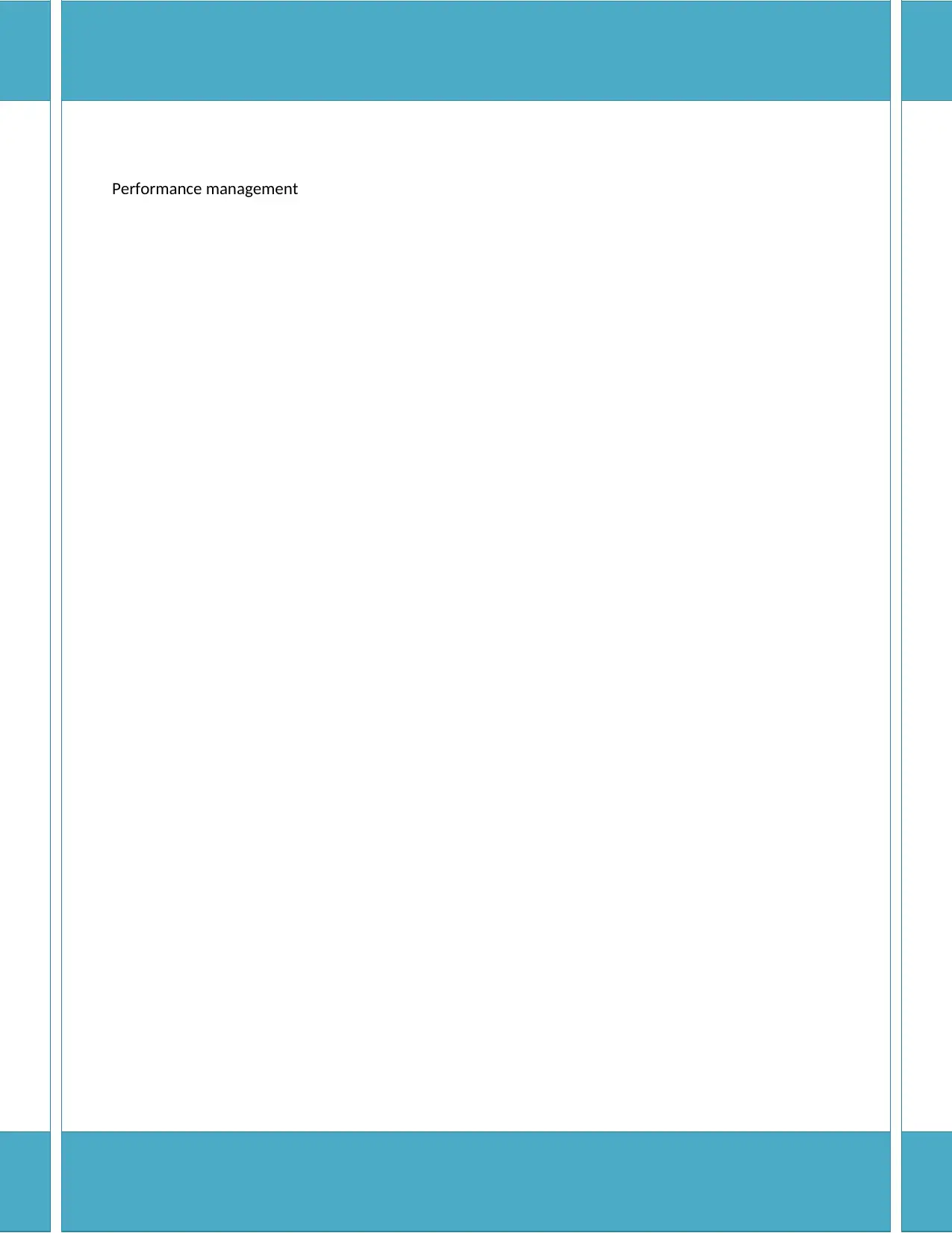
Performance management
Paraphrase This Document
Need a fresh take? Get an instant paraphrase of this document with our AI Paraphraser
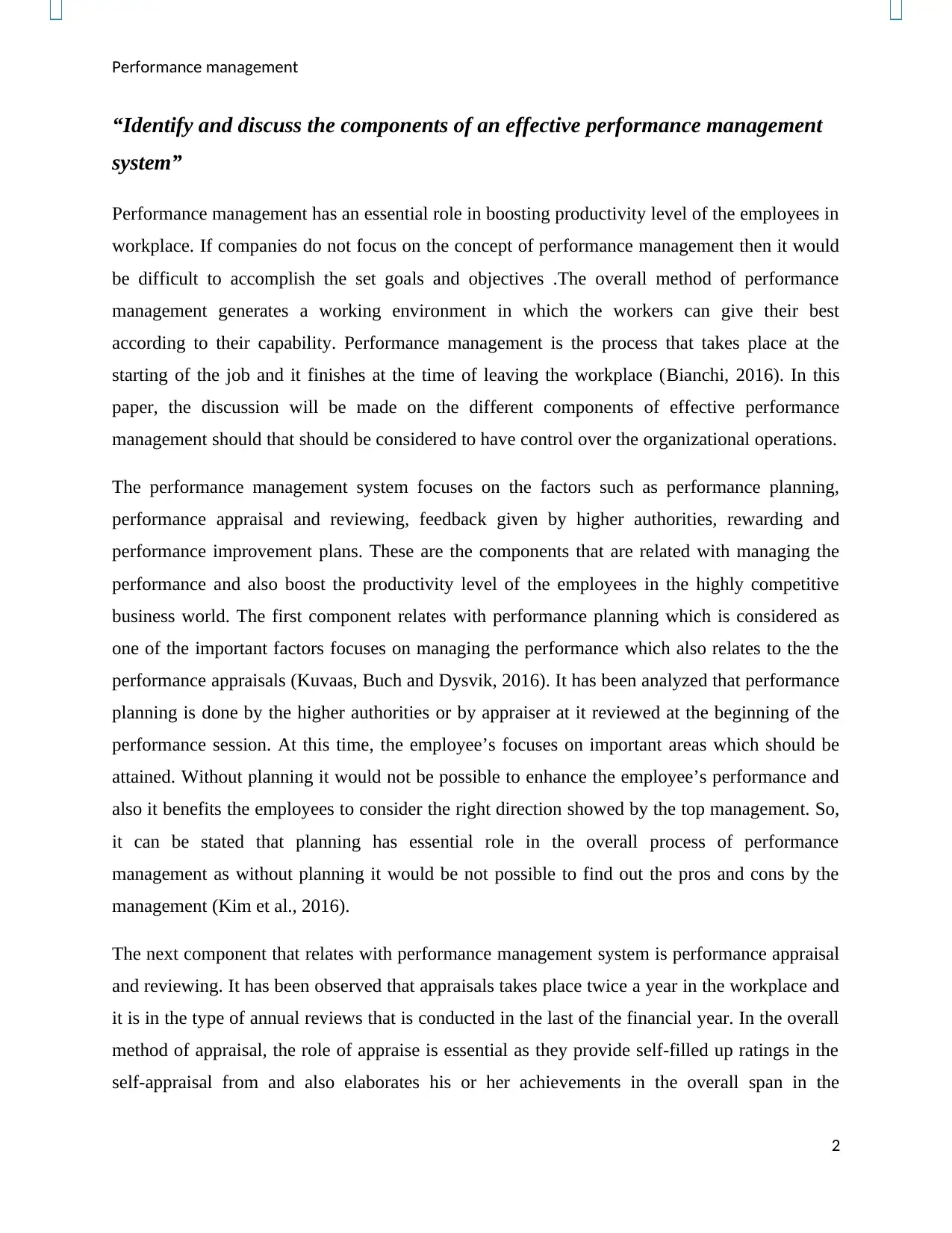
Performance management
“Identify and discuss the components of an effective performance management
system”
Performance management has an essential role in boosting productivity level of the employees in
workplace. If companies do not focus on the concept of performance management then it would
be difficult to accomplish the set goals and objectives .The overall method of performance
management generates a working environment in which the workers can give their best
according to their capability. Performance management is the process that takes place at the
starting of the job and it finishes at the time of leaving the workplace (Bianchi, 2016). In this
paper, the discussion will be made on the different components of effective performance
management should that should be considered to have control over the organizational operations.
The performance management system focuses on the factors such as performance planning,
performance appraisal and reviewing, feedback given by higher authorities, rewarding and
performance improvement plans. These are the components that are related with managing the
performance and also boost the productivity level of the employees in the highly competitive
business world. The first component relates with performance planning which is considered as
one of the important factors focuses on managing the performance which also relates to the the
performance appraisals (Kuvaas, Buch and Dysvik, 2016). It has been analyzed that performance
planning is done by the higher authorities or by appraiser at it reviewed at the beginning of the
performance session. At this time, the employee’s focuses on important areas which should be
attained. Without planning it would not be possible to enhance the employee’s performance and
also it benefits the employees to consider the right direction showed by the top management. So,
it can be stated that planning has essential role in the overall process of performance
management as without planning it would be not possible to find out the pros and cons by the
management (Kim et al., 2016).
The next component that relates with performance management system is performance appraisal
and reviewing. It has been observed that appraisals takes place twice a year in the workplace and
it is in the type of annual reviews that is conducted in the last of the financial year. In the overall
method of appraisal, the role of appraise is essential as they provide self-filled up ratings in the
self-appraisal from and also elaborates his or her achievements in the overall span in the
2
“Identify and discuss the components of an effective performance management
system”
Performance management has an essential role in boosting productivity level of the employees in
workplace. If companies do not focus on the concept of performance management then it would
be difficult to accomplish the set goals and objectives .The overall method of performance
management generates a working environment in which the workers can give their best
according to their capability. Performance management is the process that takes place at the
starting of the job and it finishes at the time of leaving the workplace (Bianchi, 2016). In this
paper, the discussion will be made on the different components of effective performance
management should that should be considered to have control over the organizational operations.
The performance management system focuses on the factors such as performance planning,
performance appraisal and reviewing, feedback given by higher authorities, rewarding and
performance improvement plans. These are the components that are related with managing the
performance and also boost the productivity level of the employees in the highly competitive
business world. The first component relates with performance planning which is considered as
one of the important factors focuses on managing the performance which also relates to the the
performance appraisals (Kuvaas, Buch and Dysvik, 2016). It has been analyzed that performance
planning is done by the higher authorities or by appraiser at it reviewed at the beginning of the
performance session. At this time, the employee’s focuses on important areas which should be
attained. Without planning it would not be possible to enhance the employee’s performance and
also it benefits the employees to consider the right direction showed by the top management. So,
it can be stated that planning has essential role in the overall process of performance
management as without planning it would be not possible to find out the pros and cons by the
management (Kim et al., 2016).
The next component that relates with performance management system is performance appraisal
and reviewing. It has been observed that appraisals takes place twice a year in the workplace and
it is in the type of annual reviews that is conducted in the last of the financial year. In the overall
method of appraisal, the role of appraise is essential as they provide self-filled up ratings in the
self-appraisal from and also elaborates his or her achievements in the overall span in the
2
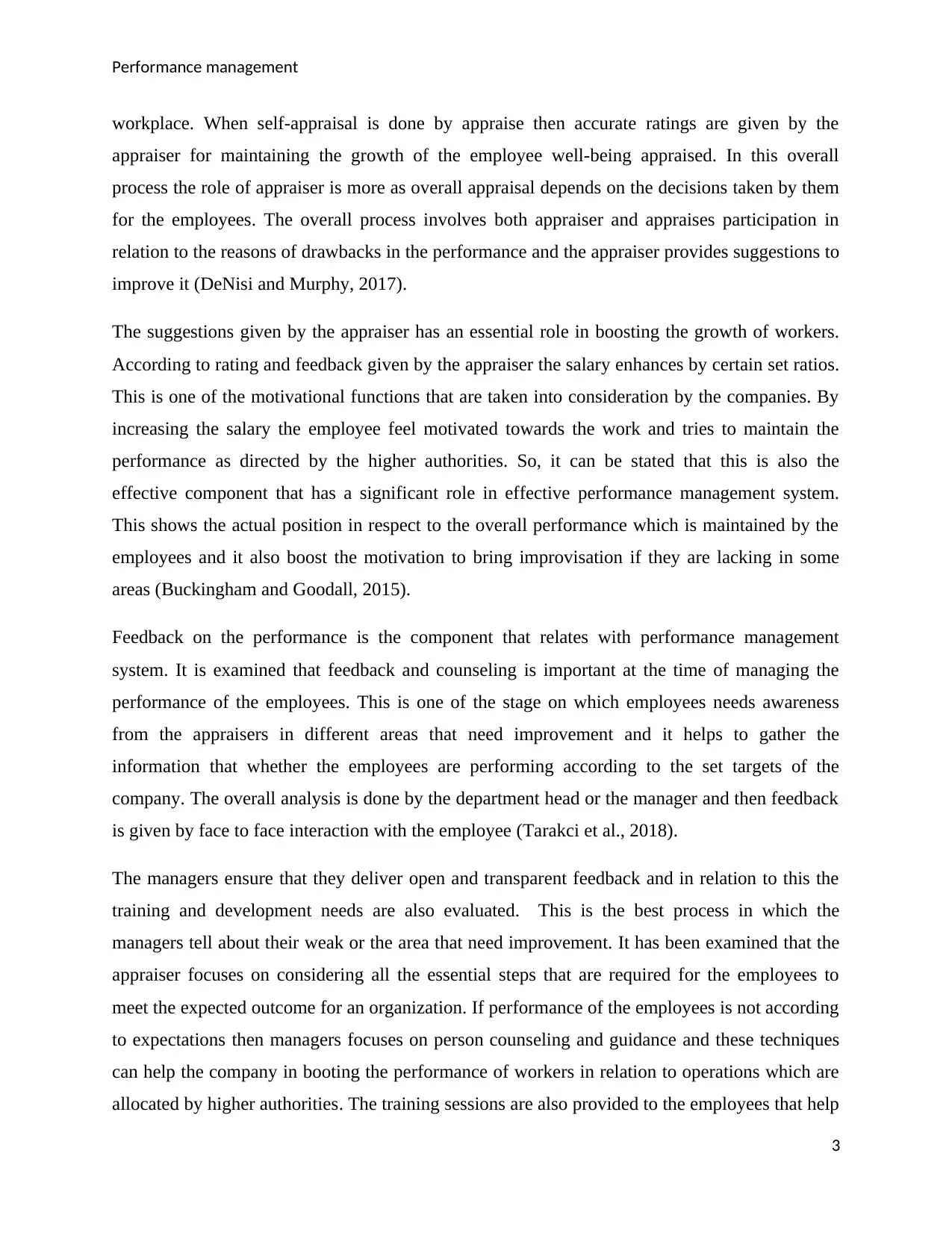
Performance management
workplace. When self-appraisal is done by appraise then accurate ratings are given by the
appraiser for maintaining the growth of the employee well-being appraised. In this overall
process the role of appraiser is more as overall appraisal depends on the decisions taken by them
for the employees. The overall process involves both appraiser and appraises participation in
relation to the reasons of drawbacks in the performance and the appraiser provides suggestions to
improve it (DeNisi and Murphy, 2017).
The suggestions given by the appraiser has an essential role in boosting the growth of workers.
According to rating and feedback given by the appraiser the salary enhances by certain set ratios.
This is one of the motivational functions that are taken into consideration by the companies. By
increasing the salary the employee feel motivated towards the work and tries to maintain the
performance as directed by the higher authorities. So, it can be stated that this is also the
effective component that has a significant role in effective performance management system.
This shows the actual position in respect to the overall performance which is maintained by the
employees and it also boost the motivation to bring improvisation if they are lacking in some
areas (Buckingham and Goodall, 2015).
Feedback on the performance is the component that relates with performance management
system. It is examined that feedback and counseling is important at the time of managing the
performance of the employees. This is one of the stage on which employees needs awareness
from the appraisers in different areas that need improvement and it helps to gather the
information that whether the employees are performing according to the set targets of the
company. The overall analysis is done by the department head or the manager and then feedback
is given by face to face interaction with the employee (Tarakci et al., 2018).
The managers ensure that they deliver open and transparent feedback and in relation to this the
training and development needs are also evaluated. This is the best process in which the
managers tell about their weak or the area that need improvement. It has been examined that the
appraiser focuses on considering all the essential steps that are required for the employees to
meet the expected outcome for an organization. If performance of the employees is not according
to expectations then managers focuses on person counseling and guidance and these techniques
can help the company in booting the performance of workers in relation to operations which are
allocated by higher authorities. The training sessions are also provided to the employees that help
3
workplace. When self-appraisal is done by appraise then accurate ratings are given by the
appraiser for maintaining the growth of the employee well-being appraised. In this overall
process the role of appraiser is more as overall appraisal depends on the decisions taken by them
for the employees. The overall process involves both appraiser and appraises participation in
relation to the reasons of drawbacks in the performance and the appraiser provides suggestions to
improve it (DeNisi and Murphy, 2017).
The suggestions given by the appraiser has an essential role in boosting the growth of workers.
According to rating and feedback given by the appraiser the salary enhances by certain set ratios.
This is one of the motivational functions that are taken into consideration by the companies. By
increasing the salary the employee feel motivated towards the work and tries to maintain the
performance as directed by the higher authorities. So, it can be stated that this is also the
effective component that has a significant role in effective performance management system.
This shows the actual position in respect to the overall performance which is maintained by the
employees and it also boost the motivation to bring improvisation if they are lacking in some
areas (Buckingham and Goodall, 2015).
Feedback on the performance is the component that relates with performance management
system. It is examined that feedback and counseling is important at the time of managing the
performance of the employees. This is one of the stage on which employees needs awareness
from the appraisers in different areas that need improvement and it helps to gather the
information that whether the employees are performing according to the set targets of the
company. The overall analysis is done by the department head or the manager and then feedback
is given by face to face interaction with the employee (Tarakci et al., 2018).
The managers ensure that they deliver open and transparent feedback and in relation to this the
training and development needs are also evaluated. This is the best process in which the
managers tell about their weak or the area that need improvement. It has been examined that the
appraiser focuses on considering all the essential steps that are required for the employees to
meet the expected outcome for an organization. If performance of the employees is not according
to expectations then managers focuses on person counseling and guidance and these techniques
can help the company in booting the performance of workers in relation to operations which are
allocated by higher authorities. The training sessions are also provided to the employees that help
3
⊘ This is a preview!⊘
Do you want full access?
Subscribe today to unlock all pages.

Trusted by 1+ million students worldwide
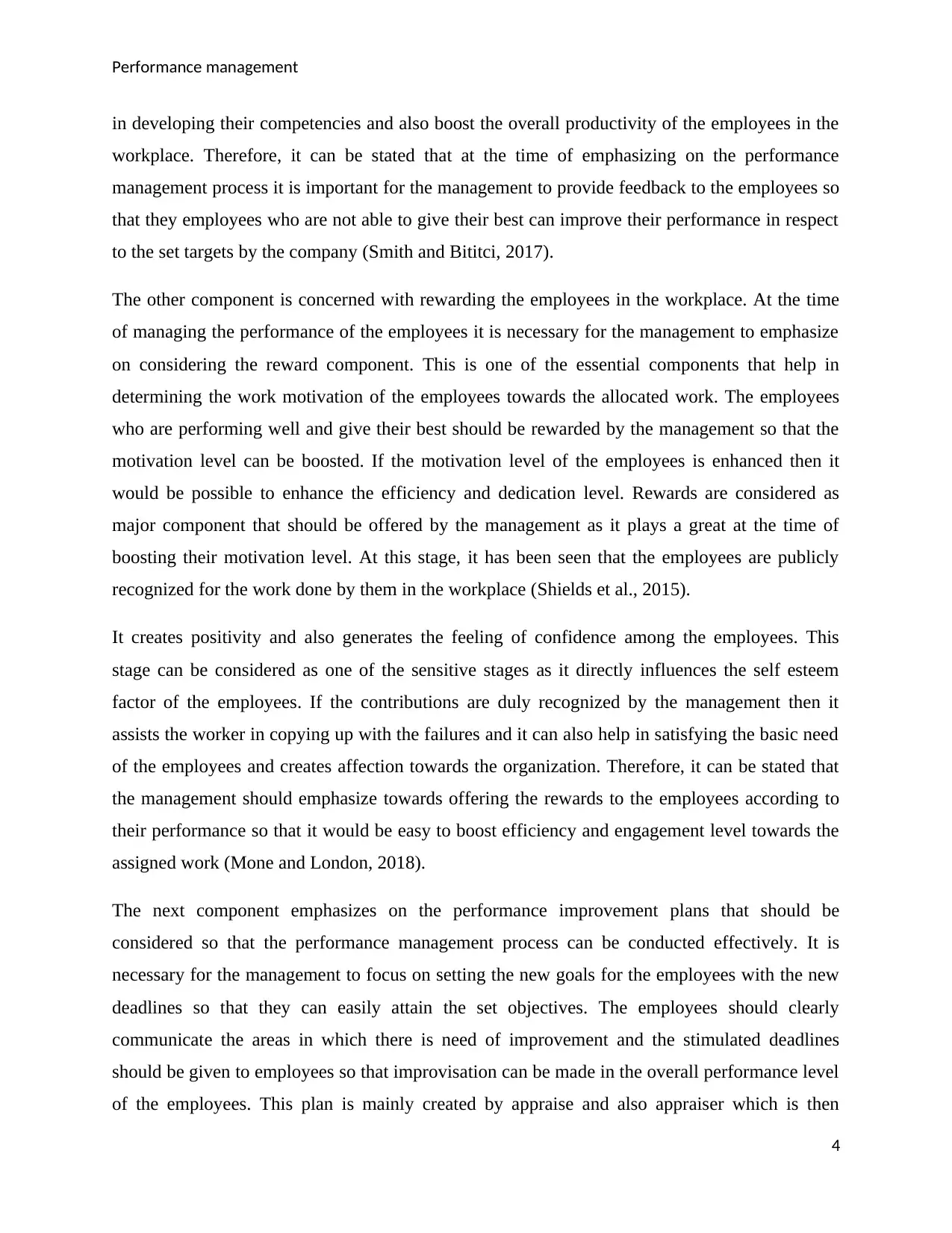
Performance management
in developing their competencies and also boost the overall productivity of the employees in the
workplace. Therefore, it can be stated that at the time of emphasizing on the performance
management process it is important for the management to provide feedback to the employees so
that they employees who are not able to give their best can improve their performance in respect
to the set targets by the company (Smith and Bititci, 2017).
The other component is concerned with rewarding the employees in the workplace. At the time
of managing the performance of the employees it is necessary for the management to emphasize
on considering the reward component. This is one of the essential components that help in
determining the work motivation of the employees towards the allocated work. The employees
who are performing well and give their best should be rewarded by the management so that the
motivation level can be boosted. If the motivation level of the employees is enhanced then it
would be possible to enhance the efficiency and dedication level. Rewards are considered as
major component that should be offered by the management as it plays a great at the time of
boosting their motivation level. At this stage, it has been seen that the employees are publicly
recognized for the work done by them in the workplace (Shields et al., 2015).
It creates positivity and also generates the feeling of confidence among the employees. This
stage can be considered as one of the sensitive stages as it directly influences the self esteem
factor of the employees. If the contributions are duly recognized by the management then it
assists the worker in copying up with the failures and it can also help in satisfying the basic need
of the employees and creates affection towards the organization. Therefore, it can be stated that
the management should emphasize towards offering the rewards to the employees according to
their performance so that it would be easy to boost efficiency and engagement level towards the
assigned work (Mone and London, 2018).
The next component emphasizes on the performance improvement plans that should be
considered so that the performance management process can be conducted effectively. It is
necessary for the management to focus on setting the new goals for the employees with the new
deadlines so that they can easily attain the set objectives. The employees should clearly
communicate the areas in which there is need of improvement and the stimulated deadlines
should be given to employees so that improvisation can be made in the overall performance level
of the employees. This plan is mainly created by appraise and also appraiser which is then
4
in developing their competencies and also boost the overall productivity of the employees in the
workplace. Therefore, it can be stated that at the time of emphasizing on the performance
management process it is important for the management to provide feedback to the employees so
that they employees who are not able to give their best can improve their performance in respect
to the set targets by the company (Smith and Bititci, 2017).
The other component is concerned with rewarding the employees in the workplace. At the time
of managing the performance of the employees it is necessary for the management to emphasize
on considering the reward component. This is one of the essential components that help in
determining the work motivation of the employees towards the allocated work. The employees
who are performing well and give their best should be rewarded by the management so that the
motivation level can be boosted. If the motivation level of the employees is enhanced then it
would be possible to enhance the efficiency and dedication level. Rewards are considered as
major component that should be offered by the management as it plays a great at the time of
boosting their motivation level. At this stage, it has been seen that the employees are publicly
recognized for the work done by them in the workplace (Shields et al., 2015).
It creates positivity and also generates the feeling of confidence among the employees. This
stage can be considered as one of the sensitive stages as it directly influences the self esteem
factor of the employees. If the contributions are duly recognized by the management then it
assists the worker in copying up with the failures and it can also help in satisfying the basic need
of the employees and creates affection towards the organization. Therefore, it can be stated that
the management should emphasize towards offering the rewards to the employees according to
their performance so that it would be easy to boost efficiency and engagement level towards the
assigned work (Mone and London, 2018).
The next component emphasizes on the performance improvement plans that should be
considered so that the performance management process can be conducted effectively. It is
necessary for the management to focus on setting the new goals for the employees with the new
deadlines so that they can easily attain the set objectives. The employees should clearly
communicate the areas in which there is need of improvement and the stimulated deadlines
should be given to employees so that improvisation can be made in the overall performance level
of the employees. This plan is mainly created by appraise and also appraiser which is then
4
Paraphrase This Document
Need a fresh take? Get an instant paraphrase of this document with our AI Paraphraser
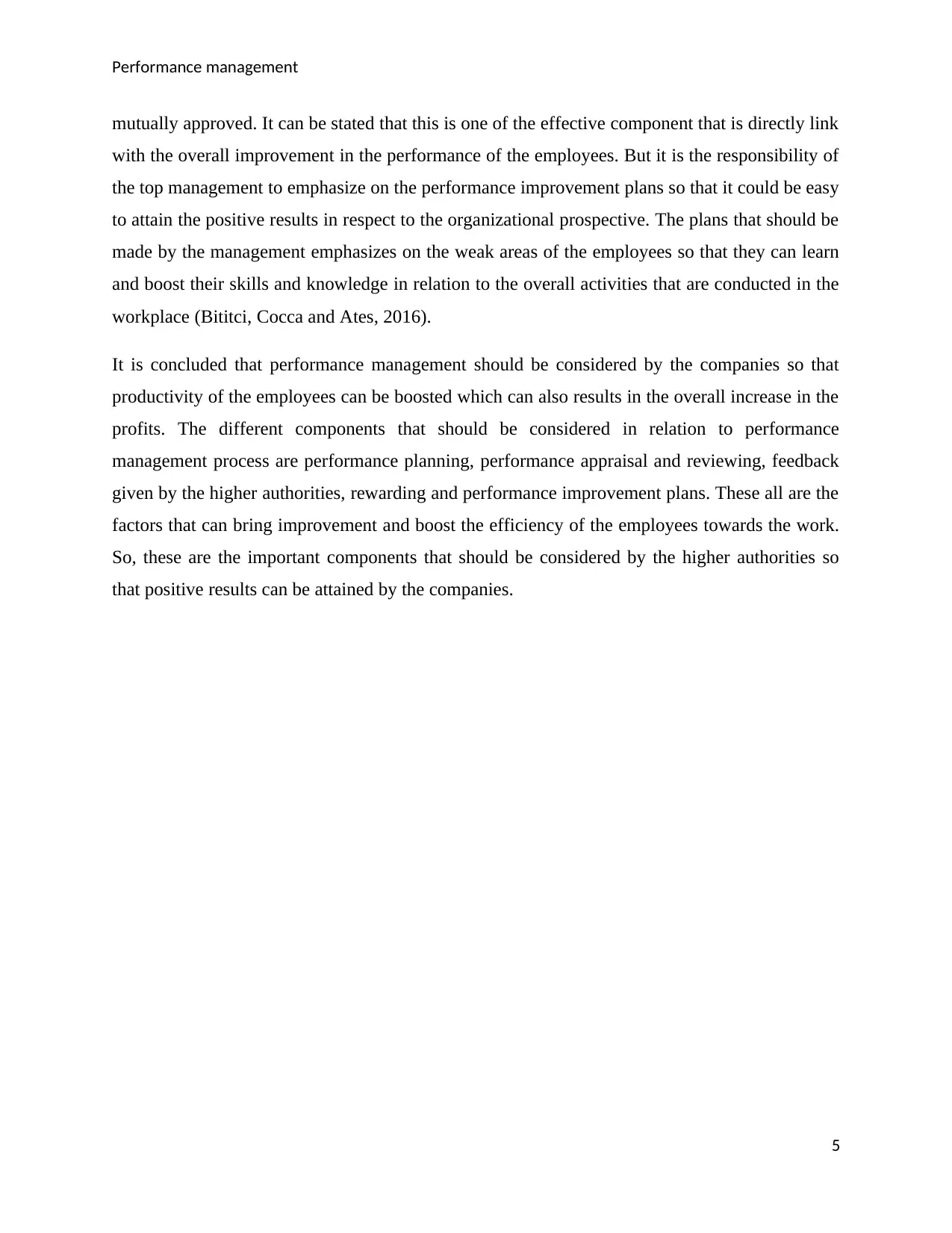
Performance management
mutually approved. It can be stated that this is one of the effective component that is directly link
with the overall improvement in the performance of the employees. But it is the responsibility of
the top management to emphasize on the performance improvement plans so that it could be easy
to attain the positive results in respect to the organizational prospective. The plans that should be
made by the management emphasizes on the weak areas of the employees so that they can learn
and boost their skills and knowledge in relation to the overall activities that are conducted in the
workplace (Bititci, Cocca and Ates, 2016).
It is concluded that performance management should be considered by the companies so that
productivity of the employees can be boosted which can also results in the overall increase in the
profits. The different components that should be considered in relation to performance
management process are performance planning, performance appraisal and reviewing, feedback
given by the higher authorities, rewarding and performance improvement plans. These all are the
factors that can bring improvement and boost the efficiency of the employees towards the work.
So, these are the important components that should be considered by the higher authorities so
that positive results can be attained by the companies.
5
mutually approved. It can be stated that this is one of the effective component that is directly link
with the overall improvement in the performance of the employees. But it is the responsibility of
the top management to emphasize on the performance improvement plans so that it could be easy
to attain the positive results in respect to the organizational prospective. The plans that should be
made by the management emphasizes on the weak areas of the employees so that they can learn
and boost their skills and knowledge in relation to the overall activities that are conducted in the
workplace (Bititci, Cocca and Ates, 2016).
It is concluded that performance management should be considered by the companies so that
productivity of the employees can be boosted which can also results in the overall increase in the
profits. The different components that should be considered in relation to performance
management process are performance planning, performance appraisal and reviewing, feedback
given by the higher authorities, rewarding and performance improvement plans. These all are the
factors that can bring improvement and boost the efficiency of the employees towards the work.
So, these are the important components that should be considered by the higher authorities so
that positive results can be attained by the companies.
5
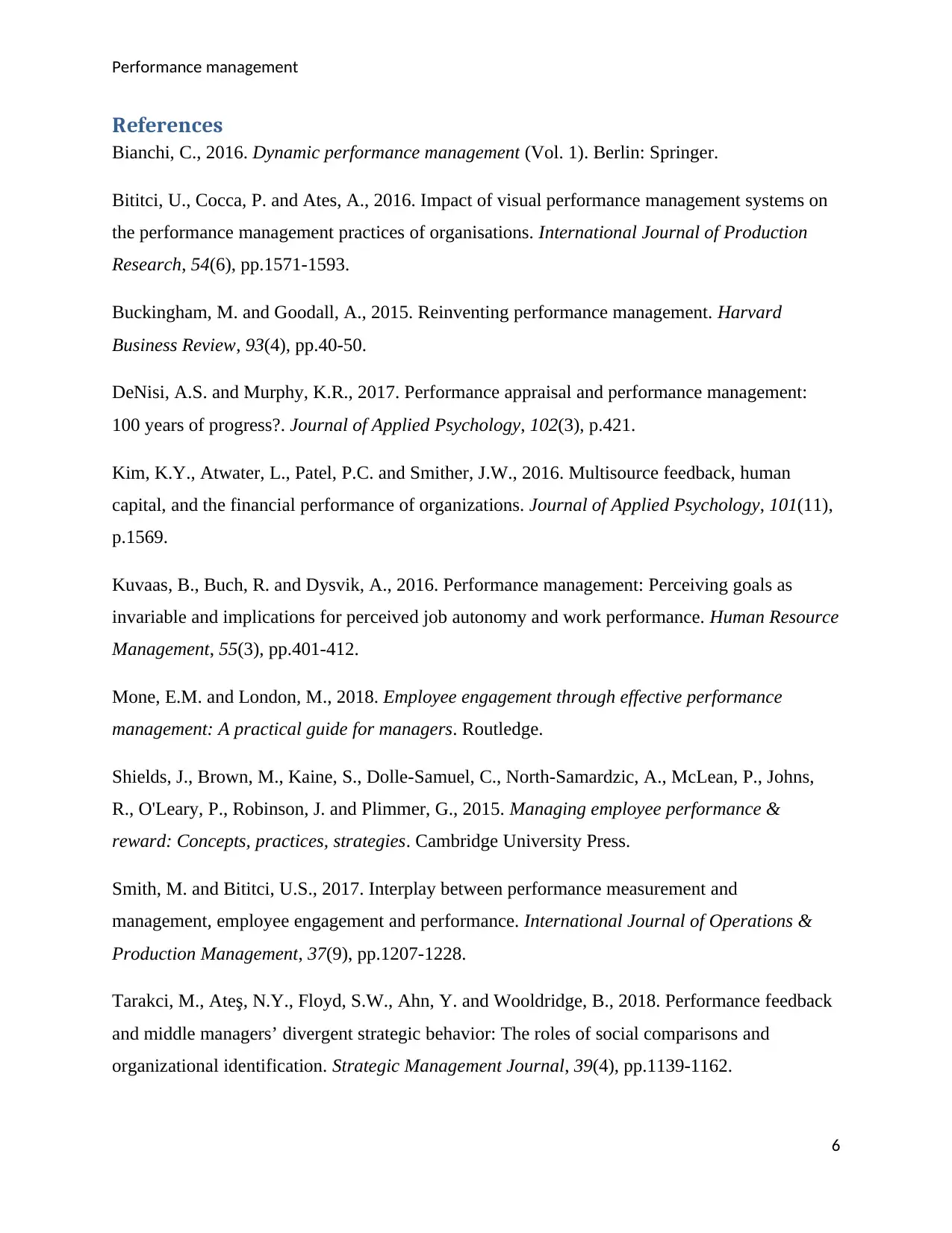
Performance management
References
Bianchi, C., 2016. Dynamic performance management (Vol. 1). Berlin: Springer.
Bititci, U., Cocca, P. and Ates, A., 2016. Impact of visual performance management systems on
the performance management practices of organisations. International Journal of Production
Research, 54(6), pp.1571-1593.
Buckingham, M. and Goodall, A., 2015. Reinventing performance management. Harvard
Business Review, 93(4), pp.40-50.
DeNisi, A.S. and Murphy, K.R., 2017. Performance appraisal and performance management:
100 years of progress?. Journal of Applied Psychology, 102(3), p.421.
Kim, K.Y., Atwater, L., Patel, P.C. and Smither, J.W., 2016. Multisource feedback, human
capital, and the financial performance of organizations. Journal of Applied Psychology, 101(11),
p.1569.
Kuvaas, B., Buch, R. and Dysvik, A., 2016. Performance management: Perceiving goals as
invariable and implications for perceived job autonomy and work performance. Human Resource
Management, 55(3), pp.401-412.
Mone, E.M. and London, M., 2018. Employee engagement through effective performance
management: A practical guide for managers. Routledge.
Shields, J., Brown, M., Kaine, S., Dolle-Samuel, C., North-Samardzic, A., McLean, P., Johns,
R., O'Leary, P., Robinson, J. and Plimmer, G., 2015. Managing employee performance &
reward: Concepts, practices, strategies. Cambridge University Press.
Smith, M. and Bititci, U.S., 2017. Interplay between performance measurement and
management, employee engagement and performance. International Journal of Operations &
Production Management, 37(9), pp.1207-1228.
Tarakci, M., Ateş, N.Y., Floyd, S.W., Ahn, Y. and Wooldridge, B., 2018. Performance feedback
and middle managers’ divergent strategic behavior: The roles of social comparisons and
organizational identification. Strategic Management Journal, 39(4), pp.1139-1162.
6
References
Bianchi, C., 2016. Dynamic performance management (Vol. 1). Berlin: Springer.
Bititci, U., Cocca, P. and Ates, A., 2016. Impact of visual performance management systems on
the performance management practices of organisations. International Journal of Production
Research, 54(6), pp.1571-1593.
Buckingham, M. and Goodall, A., 2015. Reinventing performance management. Harvard
Business Review, 93(4), pp.40-50.
DeNisi, A.S. and Murphy, K.R., 2017. Performance appraisal and performance management:
100 years of progress?. Journal of Applied Psychology, 102(3), p.421.
Kim, K.Y., Atwater, L., Patel, P.C. and Smither, J.W., 2016. Multisource feedback, human
capital, and the financial performance of organizations. Journal of Applied Psychology, 101(11),
p.1569.
Kuvaas, B., Buch, R. and Dysvik, A., 2016. Performance management: Perceiving goals as
invariable and implications for perceived job autonomy and work performance. Human Resource
Management, 55(3), pp.401-412.
Mone, E.M. and London, M., 2018. Employee engagement through effective performance
management: A practical guide for managers. Routledge.
Shields, J., Brown, M., Kaine, S., Dolle-Samuel, C., North-Samardzic, A., McLean, P., Johns,
R., O'Leary, P., Robinson, J. and Plimmer, G., 2015. Managing employee performance &
reward: Concepts, practices, strategies. Cambridge University Press.
Smith, M. and Bititci, U.S., 2017. Interplay between performance measurement and
management, employee engagement and performance. International Journal of Operations &
Production Management, 37(9), pp.1207-1228.
Tarakci, M., Ateş, N.Y., Floyd, S.W., Ahn, Y. and Wooldridge, B., 2018. Performance feedback
and middle managers’ divergent strategic behavior: The roles of social comparisons and
organizational identification. Strategic Management Journal, 39(4), pp.1139-1162.
6
⊘ This is a preview!⊘
Do you want full access?
Subscribe today to unlock all pages.

Trusted by 1+ million students worldwide

Performance management
7
7
1 out of 7
Related Documents
Your All-in-One AI-Powered Toolkit for Academic Success.
+13062052269
info@desklib.com
Available 24*7 on WhatsApp / Email
![[object Object]](/_next/static/media/star-bottom.7253800d.svg)
Unlock your academic potential
Copyright © 2020–2026 A2Z Services. All Rights Reserved. Developed and managed by ZUCOL.





